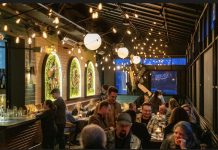
When EastEats opened in early October, the geodesic dome dining experience situated in Detroit’s Jefferson-Chalmers neighborhood was celebrated for innovating a new way to provide diners a socially distanced, outdoor dining experience amid a global pandemic. As the safety of indoor dining remains a concern for many cautious diners and as patio seating shuts down as temps drop this season, founding partners Nygel Fyvie, Lloyd Talley, and Kwaku Osei-Bonsu designed a concept that would allow guests to continue enjoying an outdoor dining concept from the comfort of a semi-private, heated, photo-worthy dome.
But the mission of EastEats extends far beyond serving the needs of hungry diners during the COVID-19 crisis. The restaurant addresses other local and national concerns, too. Osei-Bonsu gives us the full picture.
1. Eliminating Waste
The trio of founders of EastEats designed a space that would address a current need, while being mindful of sustainable practices that would have a positive impact on our planet in the long-run. Founding partner Kwaku Osei-Bonsu says he leveraged his knack for upcycling materials as a milliner in the design elements for the domes. “Because I’m into upcycling, all of the materials that were used to build were upcycled,” he says.
Items such as platforms and fencing were constructed with salvaged materials, and wooden wire spools with their tops wrapped in soft fabrics and shipping crates topped with table linens make up the stools and dining tables in the domes’ interiors. “We were really intentional about upcycling because waste in Detroit is such an issue — in the whole world, really. Waste and pollution is an international conversation, and we’re addressing it from a local perspective.”
2. Reimagining Untapped Land
Osei-Bonsu acquired the land that would become the premises of EastEats for just $100, through a city initiative that encourages homeowners to make use of vacant land within their neighborhood. When founding partner Lloyd Talley approached him about the concept of launching a restaurant made of geodesic domes in the city, Osei-Bonsu offered up the land for the project. “We were addressing two things at once: We saw that this was a new and potential model, not only for the restaurant industry, but also land usage,” he says.
Organizations such as Detroit Future City offer resources to help property owners conceive new concepts for making use of abandoned land, many of which are rooted in farm and garden ideas, which don’t resonate with everyone. “Community gardens, butterfly gardens, rainwater collection sites; all of those things are necessary, but not everyone has a green thumb or even an interest in gardening.”
As co-founder of Detroit Black Restaurant Week, Osei-Bonsu saw a food-related project as a natural fit. “This conversation is so important because there are so many different amazing ideas that could be held back by red tape. The first Black-owned Cider Mill in Detroit was just opened — which is also on a side lot! When we’re talking about a city like Detroit with so much vacant land, I think that the very strict interpretation of how that land can be used needs to be softened if we really want to motivate Detroiters to buy the land that they live around.”
3. Cultural Connectivity
Osei-Bonsu says one of the pillars of the EastEats ethos is to “connect the Eastside of Detroit to the eastern hemisphere.” Its dim-sum-style service introduces diners to a style typified by Chinese eateries where servers present guests with a tray of food items to choose from. At EastEats, guests can choose among chef Nygel Fyvie’s menu of handmade tacos, Asian-inspired sides, and desserts while supplies last. The team is currently looking to expand to a Westside location, connecting guests to cuisine from the western hemisphere. “With moving to the Westside, we’d be looking to do pretty much the same thing but would obviously change our menu with the second iteration.”
In the New Year, Osei-Bonsu says the team is planning daytime operations that would bring another new concept to the EastEats side lot — a co-working space. Aptly (and cleverly) named Work from Dome, Osei-Bonsu says the model would provide usage for the space during the daytime before the restaurant opens. “Work from Dome is our daytime activation of EastEats in which the space becomes a co-working space, offering WIFI, snacks, teas, and juices in an environment that is both safe, outdoors, and cozy. It is our hope that we can offer those that have been working from home an opportunity to break up the monotony of it all.”
EastEats is located at 1018 Navahoe St. in Detroit. For more information, visit easteats.us.
|
|
|









